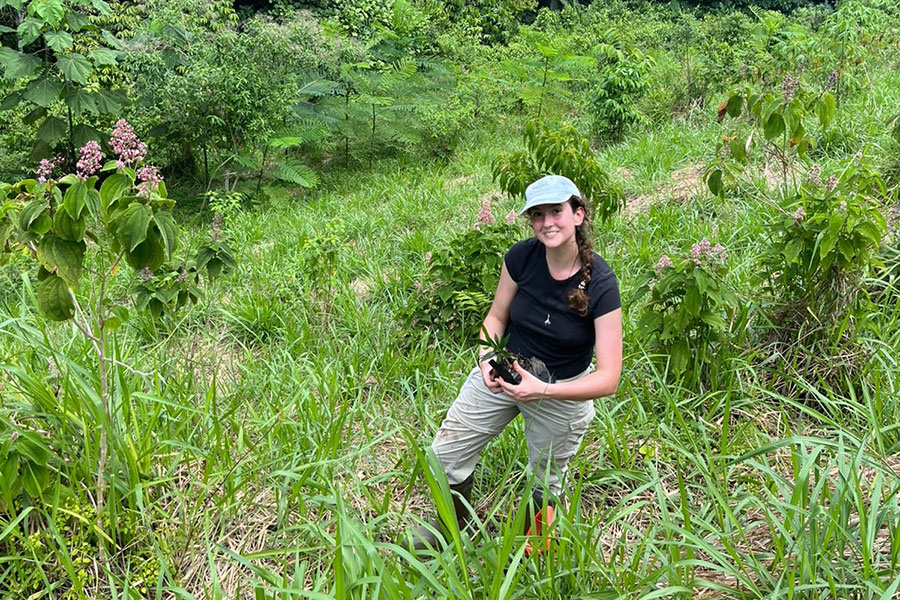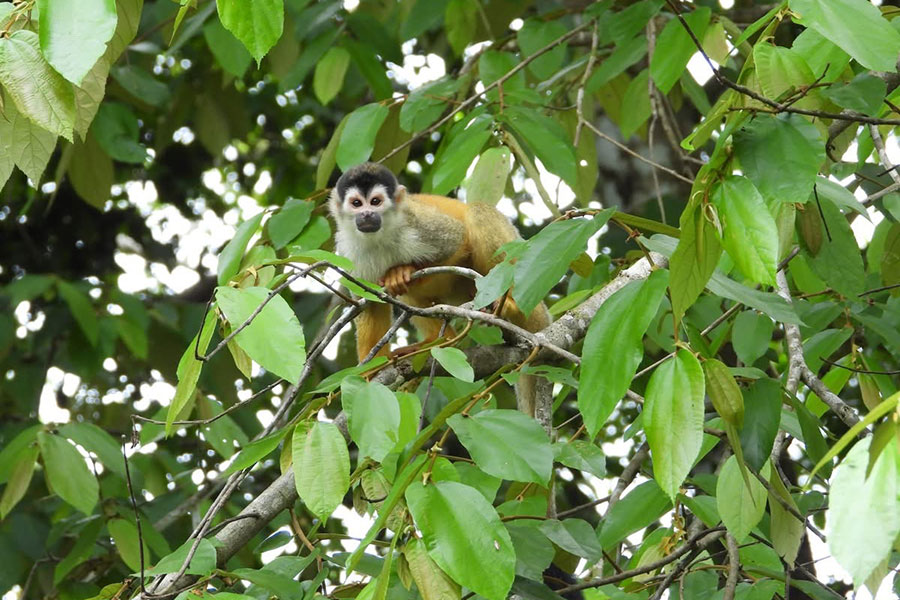Monkeys are serious business for undergraduate’s research in rainforest
by Chad Osborne
October 21, 2025

Amber Gordon woke up at four every morning this summer to the sound of screaming monkeys.
“Oh wow, these noises, what is this?” she recalled a couple of months later, sitting in a biology lab, thinking back to the dark mornings in an open-air cabin where she was jarred from a good night’s sleep by howler monkeys' guttural growl from miles away.
Those screams were not only a daily alarm but also a reminder of why Gordon made the long journey from her home in Rural Retreat, Virginia, to the Osa research campus in the Costa Rican rainforest.
Gordon, a senior Radford University Honors College student, was in the Central American country to collect data for her capstone project, examining how the size of habitats influences mixed-species associations between squirrel monkeys and capuchins in the rainforest. The purpose of her research is to better inform conservation strategies in the region.
Each morning, Gordon grabbed her GPS transmitter, binoculars and a voice recorder and ventured out on one of the 30 kilometers of trails on the Osa campus that led to rivers, beaches and waterfalls. “I hiked until I found a species,” she explained. Gordon then watched a group of squirrel monkeys and capuchins interacting for about 30 minutes and recorded them in 30-second intervals. She then returned to the research campus to transcribe her notes.

Observing the primates could be a little intimidating at times for Gordon. “The capuchins stack on top of each other and yell at you,” she recalled with a laugh a couple of months later, sitting in a Radford biology lab 3,500 miles from the intimidating primates. “And the spider monkeys fling themselves through the air and knock sticks down. There were more than a couple of times I know they threw sticks at me.”
Gordon gathered plenty of data for her research in Costa Rica but feels that she still needs more to complete her Honors capstone project. She plans to return to the Osa research this winter to conduct more studies of the primates.
The work is important to Gordon. She cares about primates and wants “to explore how they interact with their ecosystems and how we can preserve those ecosystems.”
That interest developed at Radford in a primatology course taught by Cassady Urista, professor of anthropological sciences, who mentored Gordon on the project and helped her apply for Summer Undergraduate Research Fellowships (SURF) from the university’s Office of Undergraduate Research (OURS). “She was super-helpful through the application process,” Gordon said of her mentor.
SURF grants encourage Radford students to develop original, intellectual or creative contributions to a discipline. Each SURF provides $6,000 to the student (half at the beginning of June and the second half at the beginning of August), $1,500 for the faculty mentor (paid at the beginning of August), and supplies.
Applying for the SURF was “such a rewarding process,” Gordon said of working with the OURS staff, including director Joe Wirgau.
“Dr. Wirgau and the OURS office were so helpful, and he commented on my drafts and we worked together, and it was great. It felt so great to put in so much effort into developing this project and having it be acknowledged and knowing that a committee wanted to fund my work and thought that it was worthwhile and meaningful.”
Gordon said her work with campus mentors has helped her grow as a student researcher while developing meaningful connections.
“So many people have helped and been very influential. Everyone has helped me find my place here at Radford,” she said. “I’ve formed really meaningful connections with my professors and peers in both my majors. The people I’ve met along the way, particularly in my research, really care about helping students find their own little corner of the world.”